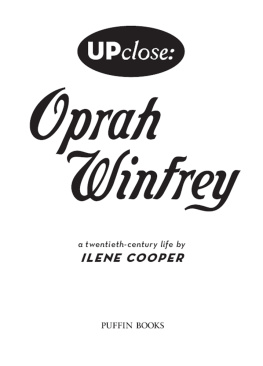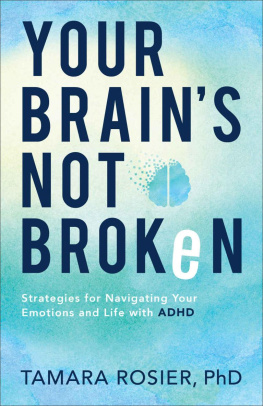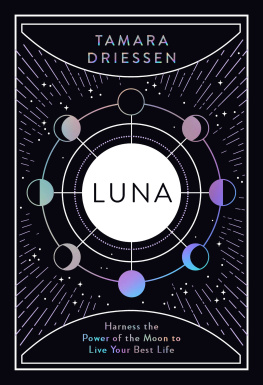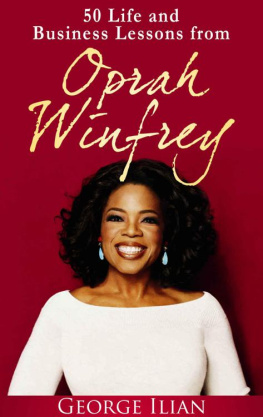
Praise for the first edition of The Sisters Are Alright
The Sisters Are Alright is a love letter to black women. Winfrey Harriss unapologetic celebration of our intelligence, mettle, and beauty counters the proliferation of negative stereotypes we endure daily. She sees us, she knows us, and she also understands that were not monolithic. Winfrey Harris surfaces stories about black womens realities that are often glossed over or tossed aside, urgently insisting with beautiful prose that contrary to our cultural narrative, black womens lives matter.
Jamia Wilson, Executive Director, Women, Action, and the Media
Tamara Winfrey Harris picks up where Ntozake Shange left off, adding an eighth color to the rainbow of For Colored Girls. This academic work reads like a choreo-poem that challenges the notion that black women are too tough to love or be loved. The author does more than deconstruct the stereotype of Sapphire; she asserts that black women are diamonds, and she insists that her reader consider their sparkle.
Duchess Harris, PhD, Professor of American Studies, Macalester College, and author of Black Feminist Politics from Kennedy to Obama
Tamara Winfrey Harriss book The Sisters Are Alright is a fitting answer to the question W. E. B. Du Bois said all black Americans are forced to consider: How does it feel to be a problem? In a society that treats black people as problems and women as problems, it is nothing short of revolutionary to answer, as this book does, No, really, the sisters are alright.
Jarvis DeBerry, journalist, the Times-Picayune, NOLA.com
The Sisters Are Alright is written with the same honest, compassionate tone Tamar a Winfrey Harris is known for. This book feels like a hug for the overlooked brown girl. Its a combination of experience, honest reflection, history and popular culture, and a good read no matter your race or experience. She brings it home with a strong call to action, reminding us that while resilience is necessary, so is basic human respectand we would do well to follow her lead.
Samhita Mukhopadhyay, author of Outdated: Why Dating Is Ruining Your Love Life

The Sisters Are Alright, Second Edition
Copyright 2015, 2021 by Tamara Winfrey-Harris
All rights reserved. No part of this publication may be reproduced, distributed, or transmitted in any form or by any means, including photocopying, recording, or other electronic or mechanical methods, without the prior written permission of the publisher, except in the case of brief quotations embodied in critical reviews and certain other noncommercial uses permitted by copyright law. For permission requests, write to the publisher, addressed Attention: Permissions Coordinator, at the address below.
| Berrett-Koehler Publishers, Inc.
1333 Broadway, Suite 1000
Oakland, CA 94612-1921
Tel: (510) 817-2277, Fax: (510) 817-2278
www.bkconnection.com |
Ordering information for print editions
Quantity sales. Special discounts are available on quantity purchases by corporations, associations, and others. For details, contact the Special Sales Department at the Berrett-Koehler address above.
Individual sales. Berrett-Koehler publications are available through most bookstores. They can also be ordered directly from Berrett-Koehler: Tel: (800) 929-2929; Fax: (802) 864-7626; www.bkconnection.com
Orders for college textbook/course adoption use. Please contact Berrett-Koehler: Tel: (800) 929-2929; Fax: (802) 864-7626.
Distributed to the U.S. trade and internationally by Penguin Random House Publisher Services.
Berrett-Koehler and the BK logo are registered trademarks of Berrett-Koehler Publishers, Inc.
Second Edition
Paperback print edition ISBN 978-1-5230-9388-5
PDF e-book ISBN 978-1-5230-9389-2
IDPF e-book ISBN 978-1-5230-9390-8
Digital audio ISBN 978-1-5230-9391-5
2021-1
Book production by Happenstance Type-O-Rama.
Cover design: Wes Youssi, M.80 Design. Cover illustration: Adee Roberson.
Front cover photo: Jon Feingersh Photography. Author photo: Grace Miller Photography.
To Black women all over the world. My sisters. I see you. I love you. We will get free together.
About the Cover
B lack women possess so much joy and love, yet we are told that we do not deserve this. Then there is systematic oppression keeping our access to love, respect, joy, and highest self-worth at arms length. Through this collage I incorporated rich color, shapes, and atmosphere that aim to recontextualize this narrative. Art is powerful in the way that we can create our own universe in which our dreams and visions for the future come true.
Adee Roberson
Contents
Preface
I love Black women.
I love the Baptist church mothers in white.
I love the girls who buss it on TikTok.
I love the sisters with Ivy League degrees and the ones with GEDs.
I love the big mamas, madears, and aunties.
I love the loc-wearing sisters who smell like shea butter.
I love the ladies of the Divine Nine.
I love the hot girls in Savage Fenty, designer pumps, and premium lacefronts; and the sisters who keep a fresh Caesar.
I love the girls who jumped double Dutch and played hopscotch.
I love the Nam-myoho-renge-kyo chanters, the hoodoos, and the atheists.
I love the hustlers, scratching and surviving, trying to make a way out of no way.
I love the trans sisters living out loud.
I love the awkward Black girls and the quirky Black girls and the Black girls who listen to punk.
I love the standing at the bus stop, sucking on a lollipop round the way girls.
I love Black women. I love us in every way we show up in the world.
Black women have claimed and asserted our power, laying new ground for collective liberation since I wrote the first edition of The Sisters Are Alright in 2015. Like we always do. It ignites my spirit.
We have our first biracial Black woman as vice president of the United States. (OReillys dismissal had nothing to do with Bey. I just wanted to provide a moment of schadenfreude. Or, in Black girl speak, youhatetoseeit.)
Black women have come a long way. We are still not free, though.
Black women organizers routinely put their lives on the line to protest violence against other bodies, while brutality against ours provokes shamefully little passion. Black women with privileges, such as class, education, and light skin, have far better access to power and achievement. (Insulation from racism and misogyny sold separately.) Too many of us are poor. Too many of us dont have health care. Too many of us are or have been incarcerated. Too many of us are struggling to gain a post-secondary education or are buried under college debt. Too many of us have been assaulted. Too many of us are carrying the weight of other peoples problems. The sisters are still alrightintrinsically valuable and human











